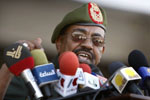
President Obama’s strategy to help stop violence perpetrated by the Lord’s Resistance Army, or LRA, provides a broad blueprint for action. For that blueprint to become a legitimate path to peace, the administration must take immediate steps to put it into action. We’re partnering with our friends at Resolve to outline six steps the administration should take to kick-start implementation of the strategy (read our posts on step 1, 2, and 3). Ultimately, the success of the strategy will be judged by whether it actually keeps people in central Africa safe from LRA attacks, but by taking these six steps President Obama can demonstrate he’s serious about achieving that goal.
Item 4: Make certain Khartoum doesn’t resume support to the LRA
Last week, southern Sudanese voted in an historic self-determination referendum, with preliminary reports suggesting an overwhelming vote for secession from Sudan to form Africa’s newest country. Initial statements from observation groups describe a broadly credible process in line with international standards. However the process is not yet complete and there remains a mounting list of issues to tackle between now and the likely independence day for South Sudan on July 9, 2011.
One crucial indicator for whether the referendum and the birth of this new nation will proceed peacefully will be an absence of reports about the LRA. The Sudan government, based in Khartoum in the northern part of Sudan, armed and supplied the LRA between 1994 and 2002 (some say 2005), using it as a proxy force to destabilize southern Sudan. During the past year, the Enough Project and U.N. investigators have reported that LRA commanders have repeatedly traveled to South Darfur and met with Sudanese army officials, as recently as in October 2010, in the hopes of rekindling this alliance. Although there is no evidence that the Sudanese army has rekindled its support to the LRA, these contacts are a significant cause for concern.
Many people in southern Sudan feared that Khartoum would use the LRA to disrupt the referendum vote or the fragile post-referendum period. Just weeks before the referendum voting began, suspected LRA attacks in South Sudan’s Western Equatoria region displaced more than 5,300 people.
In recent months, the Obama administration has demonstrated renewed commitment to ensuring a peaceful referendum process in Sudan. Going forward, senior U.S. diplomats will need to keep a close eye on the LRA and step up their engagement with Khartoum to ensure it resists any temptation to use the LRA as a proxy force and does not give safe haven to LRA commanders. Furthermore, the U.S. should encourage the Sudanese government to apprehend any LRA commanders who travel to South Darfur.
U.S. economic sanctions on Sudan and Sudan’s designation as a State Sponsor of Terrorism are key sources of leverage in ensuring Khartoum and the LRA don’t reconnect. The Darfur Peace and Accountability Act of 2006 states that the U.S. cannot lift certain economic sanctions on Sudan unless it is “acting in good faith to …fully cooperates with efforts to disarm, demobilize, and deny safe haven to members of the Lord’s Resistance Army in Sudan.” Last year President Obama promised Khartoum that it will accelerate the process of removing Sudan from the SSTL if it fully implements its 2005 Comprehensive Peace Agreement with South Sudan and respects the results of this month’s referendum. In addition to these conditions, the law requires President to certify that Sudan has not provided support to terrorist groups for the prior six months in order to remove them from the SSTL. This includes the LRA, which was placed on the U.S. Terrorist Exclusion List by President Bush in 2001.
Last week, U.S. Deputy Assistant Secretary for African Affairs Karl Wycoff told reporters he had seen no evidence of Sudanese support for the LRA, but that “it’s something we closely monitor.”
Investigating allegations that the Sudanese government is supplying or giving safe haven to LRA commanders is not easy, and will require the U.S. to dedicate more diplomatic and intelligence resources to the task. U.S. Ambassador to the U.N. Susan Rice should also work at the U.N. Security Council to ensure that U.N. peacekeepers in South Sudan and U.N./A.U. peacekeepers in Darfur investigate these claims. Additionally, Ambassador Susan Rice should encourage the U.N. Security Council to establish and implement a mechanism to improve the council’s understanding and monitoring of the LRA. This could take the form of regular reporting to the council by the Secretary General specifically on the LRA, supported by a team of experts established and based in the region.
By both encouraging Sudan to avoid future contact with the LRA and investigating the claims that members of the government in Khartoum have supplied or given safe haven to the LRA, President Obama can demonstrate how seriously he takes the threat of LRA violence in relation to peace and stability in Sudan and across central Africa.
Photo: Sudanese President Omar al-Bashir addresses soldiers in a rally in Khartoum (AP)

